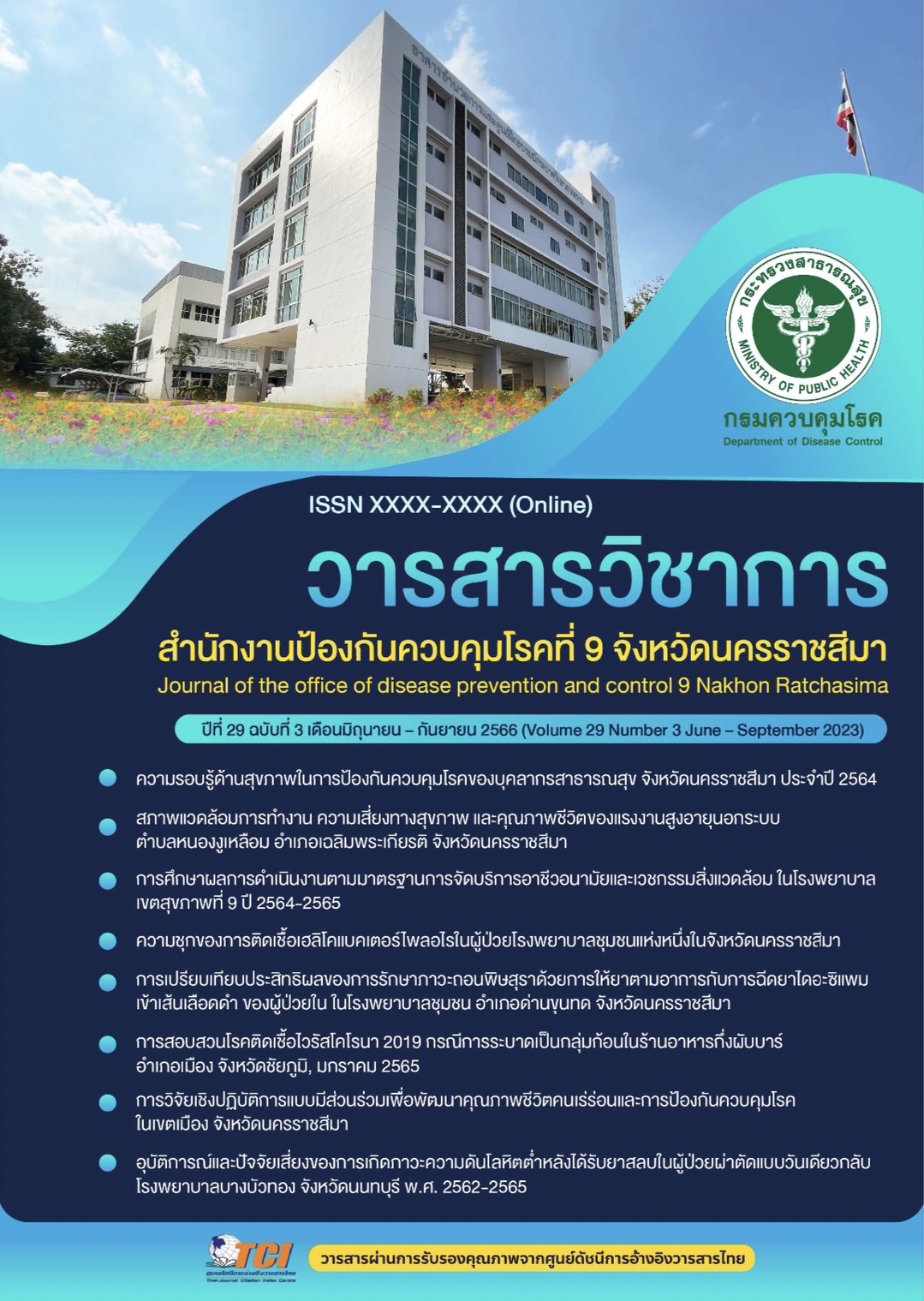The prevalence of Helicobacter pylori infection among patients in a community hospital, Nakhon Ratchasima province
Keywords:
H. pylori infection, Esophagogastroduodenoscopy, Rapid urease (CLO) testAbstract
Helicobacter pylori (H. pylori) is a gram-negative bacterium found in the human stomach, which can cause chronic gastritis and may even lead to cancer. Studies on the prevalence of H. pylori infection using upper gastrointestinal endoscopy and the rapid urease (CLO) test in community hospitals in Thailand are limited. Therefore, this retrospective cross-sectional descriptive study aimed to investigate the prevalence and risk factors of H. pylori infection among 400 cases undergoing upper gastrointestinal endoscopy at a community hospital in Nakhon Ratchasima Province. The data were collected from January 1, 2019, to December 31, 2021. The results among the 400 participants showed that there were 212 males (53.00%), with a median age of 61 years (ranging from 17 to 95 years). Diagnosis using esophagogastroduodenoscopy indicated that most of them had gastritis (58.00%), followed by gastric ulcer (23.25%), and duodenal ulcer (11.00%). Moreover, 85 out of 363 were detected with H. pylori through the rapid urease test (CLO). Consequently, the prevalence of H. pylori infection in the hospital was 23.42%. The identified risk factors were those who used bolus or liquid Thai traditional medicine (OR = 3.22, p = 0.015) and those who had duodenal ulcers (OR = 2.15, p = 0.043). Thus, the study recommends early diagnosis, particularly for people who had duodenal ulcers and used bolus or liquid Thai traditional medicine. This approach may help minimize the severity of the infection and reduce the risk of important complications, such as cancer.
References
Zamani M, Ebrahimtabar F, Zamani V, et al. Systematic review with meta-analysis: the worldwide prevalence of Helicobacter pylori infection. Aliment Pharmacol Ther. 2018;47(7):868–876.
Prakitpunthu T. Helicobacter pylori: basic and surgical practice. Thai J Surgery. 1997;18(2):73-87.
Vivatvakin B, Theamboonlers A, Semakachorn N, Wongsawadi L. Prevalence of CagA and VacA genotype of Helicobacter pylori in Thai children. J Med Assoc Thai. 2004;87(11):1327-1331.
Kishk RM, Soliman NM, Anani MM, et al. Genotyping of Helicobacter pylori virulence genes CagA and VacA: regional and national study. Int J Microbiol. 2021;2021:1-7.
Uchida T, Miftahussurur M, Pittayanon R, et al. Helicobacter pylori infection in Thailand: a nationwide study of the CagA phenotype. PLoS ONE. 2015;10(9):e0136775.
Kuntaraksa N. Diagnostic Test for Helicobacter Pylori infection by histology and rapid urease (CLO) test at Surin Hospital. Med J Sisaket Surin Buriram Hosp. 2009;24(3):45-54.
Mitipat N, Siripermpool P, Jadwattanakul T, Chaunthongkum S. The prevalence of Helicobacter pylori infection in patients with gastrointestinal symptoms in Chon Buri, Thailand. Southeast Asian J Trop Med Public Health. 2005;36(2):341-346.
Kullavanijaya P, Thong-Ngam D, Hanvivatvong O, Nunthapisud P, Tangkijvanich P, Suwanagool P. Analysis of eight different methods for the detection of Helicobacter pylori infection in patients with dyspepsia. J Gastroenterol Hepatol. 2004;19(12):1392-1396.
Willems P, de Repentigny J, Hassan GM, Sidani S, Soucy G, Bouin M. The Prevalence of Helicobacter pylori infection in a quaternary hospital in Canada. J Clin Med Res. 2020;12(11):687-692.
Daniel WW. Biostatistics: a foundation for analysis in the health sciences, 7th edition. New York: John Wiley and Sons Inc; 1999.
World Health Organization. WHO STEPS surveillance manual: the WHO STEPwise approach to chronic disease risk factor surveillance/noncommunicable diseases and mental health. Gevena: World Health Organization; 2017.
Changthom S, Wirachpongsanon A, Jitpratoom P, Anuwong A. Correlation between Helicobacter Pylori gastritis and gastric mucosal pattern by narrow band imaging endoscopy in police general hospital. Mahasarakham Hosp J. 2019;13(3):78-83.
Supina S. The Prevalence of Helicobacter Pylori infection in patients with peptic ulcer disease in Phayao hospital, Phayao, Thailand. Phichit Hosp J. 2015;4:39-46.
Rugge M, Meggio A, Pennelli G, et al. Gastritis staging in clinical practice: the OLGA staging system. Gut. 2007;56(5):631–636.
Fakeye TO, Tijani A, Adebisi O. A survey of the use of herbs among patients attending secondary-level health care facilities in southwestern Nigeria. J Herb Pharmacother. 2007;7(3-4):213-227.
Asipong S. Health product use behavior with no medical indications among patients with chronic diseases at Rasi Salai, Sisaket Province. Thai J Pharm Pract. 2015;7(2):105-113.

Downloads
Published
How to Cite
Issue
Section
License
Copyright (c) 2023 The office of disease prevention and control 9th Nakhon Ratchasima

This work is licensed under a Creative Commons Attribution-NonCommercial-NoDerivatives 4.0 International License.
Articles published in the Journal of the Office of Disease Prevention and Control 9 Nakhon Ratchasima are the copyrighted property of the Office of Disease Prevention and Control 9 Nakhon Ratchasima.



